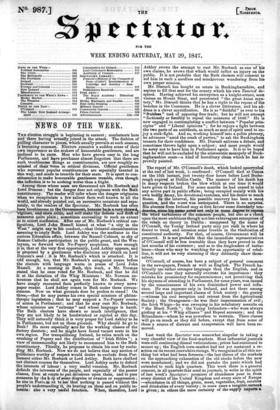The report of Mr. O'Connell's death, which looked apocryphal at
the end of last week, is confirmed : O'Connell died at Gene& on the loth instant, just twenty-four hours before Lord Besbo- rough expired at Dublin Castle. The Manner Of his death has in many respects broken the blow which at one time it would have given to Ireland. For some months be had ceased to take any- active part in public affairs • being occupied mainly with his own bodily decay, his devotional exercises, and his desire to reach Rome. Is the interval, his possible recovery has been a moot question, and the worst was anticipated. There is no surprise: His absence from Ireland may at first favour some disorderly ten- dencies, since his name acted not only in some degree to repress the blind turbulence of the common people, but also as a cheek upon the more ambitious though not less extravagant enterprises of the rebels on theory in Dublin : unopposed by the name of O'Connell, the Young Ireland party may yet rush in where he feared to tread, and occasion some trouble in the vindication of constituted authority. For that, of course, Government will be prepared. It is not probable that the immediate representatives of "O'Connell will be less tractable than they have proved in the last months of his existence ; and as to the ringleaders of turbu- lence—those who may be watching for an opportunity of rebel- lion, it will not be very alarming if they distinctly show them- selves.
O'Connell, of course, has been a subject of general comment in the newspapers, French as well as English. The French ha- bitually use rather stronger language than the English, and in O'ConnelPs case they naturally overrate his importance: they mistake his prominency for supereminence ; not perceiving that his shyness of attending in Parliament, for some years, was caused
by the consciousness of his own diminished power and influ- ence. He was supreme only in Ireland, and not there among several large and important classes of Irish society : the gentry —witness his cool reception and retreat from the Agricultural. Society ; the Orangemen—he was their impersonation of evil ; the Irish Whigs—he was sweeping in his retaliatory assaults on
"the Black North "; the Young Irelanders—who were always girdinig• at his "Whig alliance" and Repeal accounts ; and the
Ribandmen—whom he was powerless to restrain. These classes will go on much as they did before, except that from some of them a source of distrust and exasperation will have been re- moved.


























